
How Much Sugar is Okay While Bulking?
Sugar is often criticized for causing weight gain. It’s technically a calorie surplus that causes the weight gain. But sugar can certainly make it easier to get into a calorie surplus, and so increasing our sugar intake can indeed lead to weight gain.
What if we’re trying to gain weight? For a lot of us hardgainers, the idea of sugar causing accidental weight gain sounds like a potential benefit, and it can be. In fact, when Marco first started helping me bulk up, one of the first things he did was have me add some sugar (dextrose) into my workout shakes. It’s a common trick that strength coaches use with high-level athletes to help them get into a calorie surplus. Marco cut his teeth by helping college, professional, and Olympic athletes build muscle, so it was the first thing he thought of when I told him that I was having trouble gaining weight.
Look at drinks like Gatorade, designed for the Gators from the University of Florida to keep them fueled up while playing sports. It’s full of sugar. Or look at the recovery drinks we see at the supplement stores. Again, full of sugar (or starch). The same is true with weight gainers. Their main ingredient is usually either maltodextrin or dextrose—both of which are quickly broken down into sugar as soon as we drink them. Sugar is the main ingredient in bulking supplements and sports drinks.
In the general public, though, most skinny guys take the opposite approach. They’ve heard that processed sugar will raise our blood sugar levels and can lead to various health issues, including, of course, fat gain. So when they start bulking up, they intentionally try to reduce their intake of processed sugar. Now, there’s certainly no problem with that, and most health experts recommend keeping our sugar intake quite low anyway—often limiting sugar to 25% of our total calories but sometimes as low as 10% of our total calories (study).
However, the idea of limiting our sugar intake to 25% of our calories is based on the idea that eating more processed sugar can lead to nutrient deficiencies. If we eat more candy, that can mean eating fewer fruits and veggies. But that’s not all that relevant to us skinny guys who are intentionally driving ourselves into a calorie surplus to build muscle. It’s especially irrelevant if we’re getting that added sugar from sources that are rich in micronutrients, such as from fruit, fruit juice, honey, and milk. In that case, even though our sugar intake would be increasing, we’d be consuming more micronutrients.
Furthermore, sugar has a different impact on skinny guys who are underweight and exercising than it does on people who are overweight and sedentary. We don’t have the same issues controlling our blood sugar levels, removing most of the downsides to our general health. And, when combined with a good lifting routine, raising our intakes of sugar can lead to leaner muscle gains than increasing our intakes of fat.
So, what effect does sugar have on skinny guys as we bulk up? How much added sugar is helpful. How much is harmful? And how can we make it easier to bulk up quickly and leanly?
Disclaimer: Marco Walker-Ng has a degree in health sciences (BHSc) and is certified through Precision Nutrition to give diet advice (PN). However, our expertise is in building muscle, gaining strength, and improving body composition, not on the effect that our diets have on our general health. We recommend speaking to a medical professional, such as a registered dietitian, before making drastic changes to your diet.
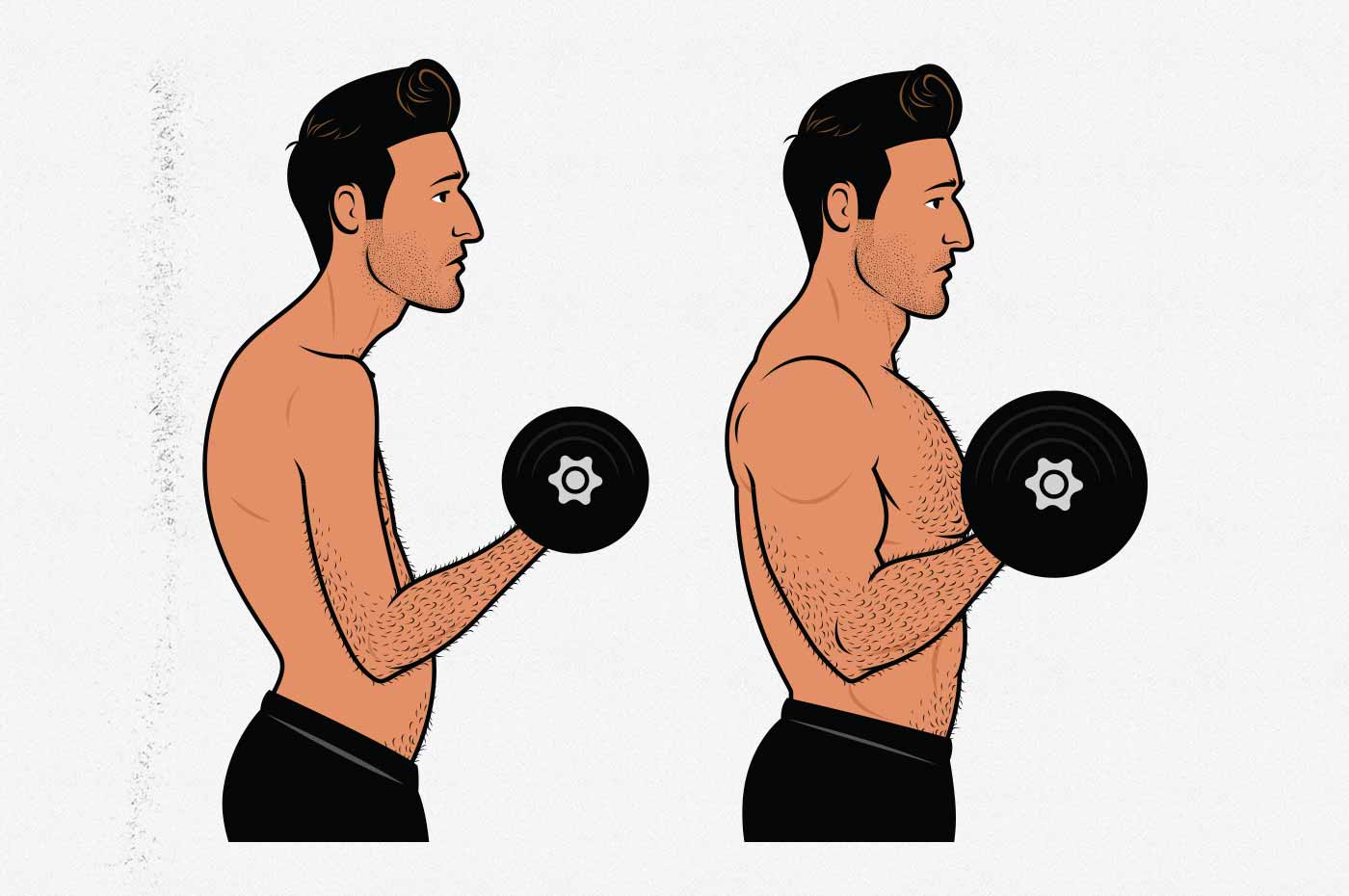
How Sugar Impacts Our Muscles
Sugar is our default source of fuel. When we eat carbs, they break down into a type of sugar called glucose, which is what the cells in our bodies use for energy. Our muscles and liver store this sugar in the form of glycogen, our blood vessels transport it around as blood sugar, and our brain even runs on sugar.
If we stop eating carbs, though—either by fasting, starving, or eating a very-low-carb diet—then we can no longer use sugar as our default fuel source. That would cause us to undergo a process called ketosis, which allows us to use fat as our main source of fuel. This is the foundation of the ketogenic diet. However, so far research is showing that the ketogenic diet isn’t very good for bulking.
Part of the reason that carbohydrates are helpful when bulking is that when we lift weights, our muscles use up the glycogen that’s stored inside of them. The more glycogen we have in our muscles, the longer we can train before our muscles start to get fatigued.
Glycogen levels aren’t an issue with strength training (study, study). Since the rep ranges are quite low, it doesn’t require much fuel. However, strength training isn’t very good for bulking.
With higher-volume hypertrophy and bodybuilding workouts, though, it can help to have muscles that have more glycogen in them. There are a few reasons for that:
- The more glycogen we have in our muscles, the more sets and reps we can do before our muscles start to get fatigued (study, study, study).
- Having muscles that are full of glycogen seems to improve rates of muscle growth, allowing us to build more muscle (study).
- Muscles that are full of glycogen look bigger and fuller, which is always nice.
So glycogen is sugar, and glycogen is great. However, our bodies can get glycogen out of most carbohydrates. In fact, we could easily get all the glycogen we need simply by consuming starches, such as rice, potatoes, and pasta. Sugar isn’t required. Furthermore, not all sugar can even be turned into glycogen.
The Common Types of Sugar
Here’s a quick breakdown of the common types of sugar:
- Glucose: most organisms use glucose as their primary fuel, and they get this fuel from plants. Plants create glucose using energy from the sun through a process called photosynthesis. Muscles use glucose as fuel, too. You’ll see it in many pre-workout supplements, energy drinks, and workout recovery drinks.
- Fructose: this is the sweetest of sugars. However, despite its sweet disposition, it has a bad reputation. This is because it’s digested differently from other sugars, which can cause problems when it’s consumed in large quantities. For example, Gropper et al found that up to 60% of us struggle to digest large quantities of fructose (study, study). This doesn’t mean that we should necessarily avoid the fructose that’s naturally occurring in fruits, but it’s one of many reasons that we may want to limit our consumption of processed foods.
- Sucrose (e.g. table sugar): regular table sugar comes from sugarcane or sugar beets, which are processed to enhance their sweetness. This processing removes the fibre and phytonutrients, leaving pure sucrose. Sucrose is a glucose unit and a fructose unit bound together into a disaccharide. It’s quite sweet, but not as sweet as pure fructose.
- High fructose corn syrup (HFCS): nowadays the cheapest way to get sugar is by processing corn, not sugarcane. When you process corn into a starch (corn starch) it isn’t very sweet. With further processing, though, corn can be processed into corn syrup, which still isn’t very sweet because it’s mostly glucose. By adding digestive enzymes into that corn syrup, though, manufacturers can increase the amount of fructose in it, turning it into high-fructose corn syrup, which is 55% fructose and 45% glucose. Because it’s slightly higher in fructose, it’s also slightly sweeter, which makes it an effective sweetener. However, fructose can also cause digestive issues and visceral fat storage when consumed in large quantities (study). This is one reason why most experts recommend limiting the consumption of added sugars.
- Lactose: Milk contains a sugar called lactose, which is a complex sugar that digests extremely slowly. In order to digest lactose, we need a digestive enzyme called lactase, and some people have more of it than others. As a result, some people can run into digestive issues when they consume lactose. (Here’s our article about bulking up with milk.)
Is There a Benefit to Simple Sugars While Bulking?
So, keeping in mind that consuming added sugar in excess is a bad idea, there are also some potential benefits to keep in mind. The first benefit is that consuming sugar is a good way to keep your muscles full of glycogen. This is why some bodybuilders like to sip on sugary drinks while working out.
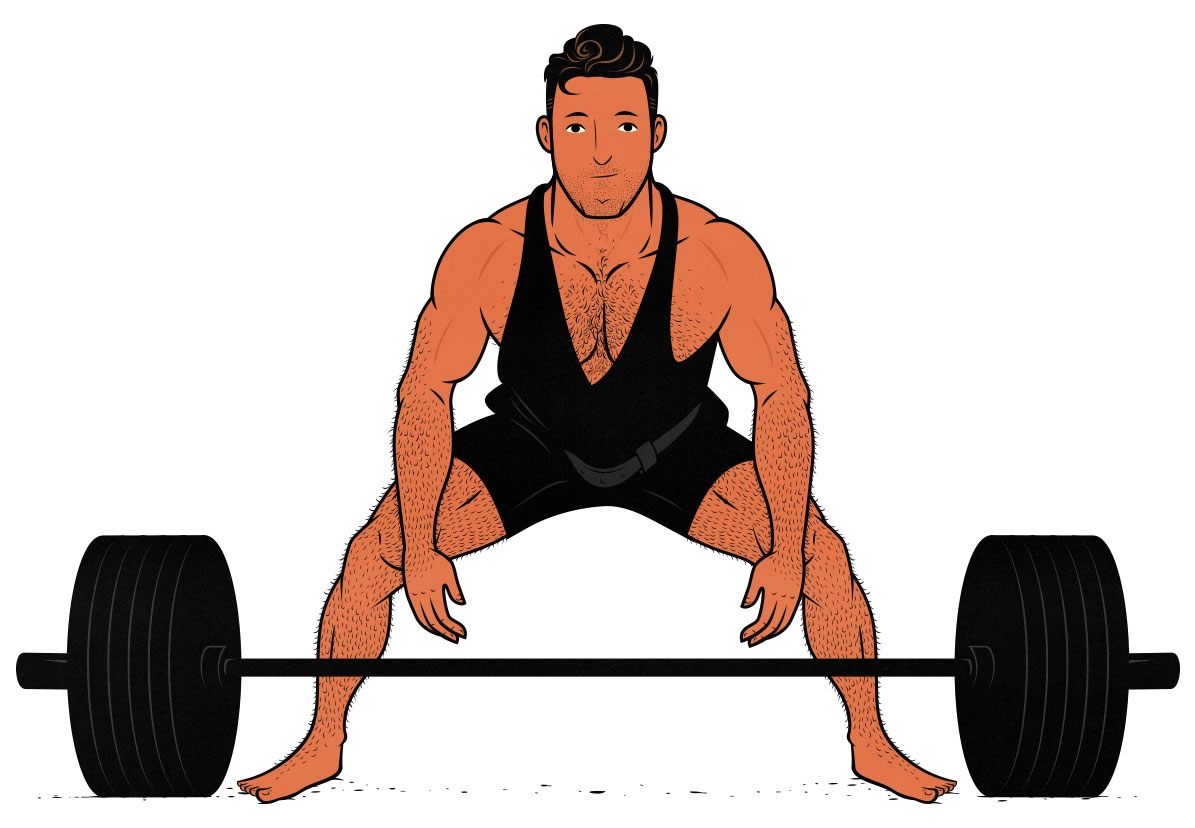
There’s an extra benefit to using sugar for that purpose, too: simple sugars tend to be quite easy to digest. If you have a pre-workout drink that has carbs in it, better for those carbs to be in the form of easily digested simple sugars (such as glucose) or simple carbs (such as maltodextrin). That way your body can digest the sugars easily, giving you a quick source of energy, and preventing your digestive system from giving you trouble while you’re exercising.
Most of us are trying to be healthy while bulking, and so it’s common for health-conscious bulkers to blend up oats so that they can have unprocessed carbs either before, during, or right after their workouts. The problem is that oats are rich in fibre, which is healthy, yes, but also makes them harder to digest. They aren’t a good quick source of energy, and they won’t leave you feeling light and energetic after eating them.
If you have a banana, though, which is richer in simpler sugars, you’ll get that energy sooner and it’ll be quite a bit easier on your digestive system. The same idea is true with energy drinks, pre-workout drinks, and even fruit juice. You get the carbs without demanding much of your stomach. So long as you keep sugar within 10–25% of your calorie intake, it can be a good strategy with minimal risk of downside.
For us skinny guys, there’s even more benefit: the simpler the carbs are, the quicker they’ll digest, and the sooner we’ll be hungry again. If lifting suppresses your appetite and jams up your digestive system (which seems to be quite common for us), you might still be able to have a protein shake with some simple carbs in it either during or after your workout. That way you don’t fall behind on your calories (or protein) for the day.
So although you don’t need simple sugars while bulking, and while there are plenty of alternatives, there might be a role for a moderate amount of simple sugar in your bulking routine.
Summary
So just to wrap up this section:
- Our bodies break down the carbs we eat into glucose (among other things), which can then be stored in our muscles in the form of glycogen. This glycogen is a tremendous asset while bulking up. The more glycogen we have, the better our workouts will go, the more muscular we’ll look, and the more muscle we’ll build.
- We don’t need to eat sugar in order to fill our muscles up with glycogen. Starchy carbs are a great source of glucose. However, fruits contain plenty of glucose as well, as do added sugars. All of these sources can be helpful while bulking up.
- Since we’re bulking up, which necessarily involves eating a ton of calories, we want to be mindful of our digestive system and also take care not to gain much fat. As a result, we should try to get most of our calories from whole foods.
- Simple sugars (and simple carbs in general) can be a good source of energy and calories while working out, and they’re usually pretty easy on our digestive systems and appetites. You might want to combine them with a protein shake.
Will Eating Sugar Cause Fat Gain?
This one is pretty easy to answer. Calories can make you gain weight, and sugar does contain calories. So yes, increasing your sugar intake could certainly drive you into a calorie surplus, which could result in weight gain. Depending on your lifestyle, a certain proportion of that weight gain will likely be fat.
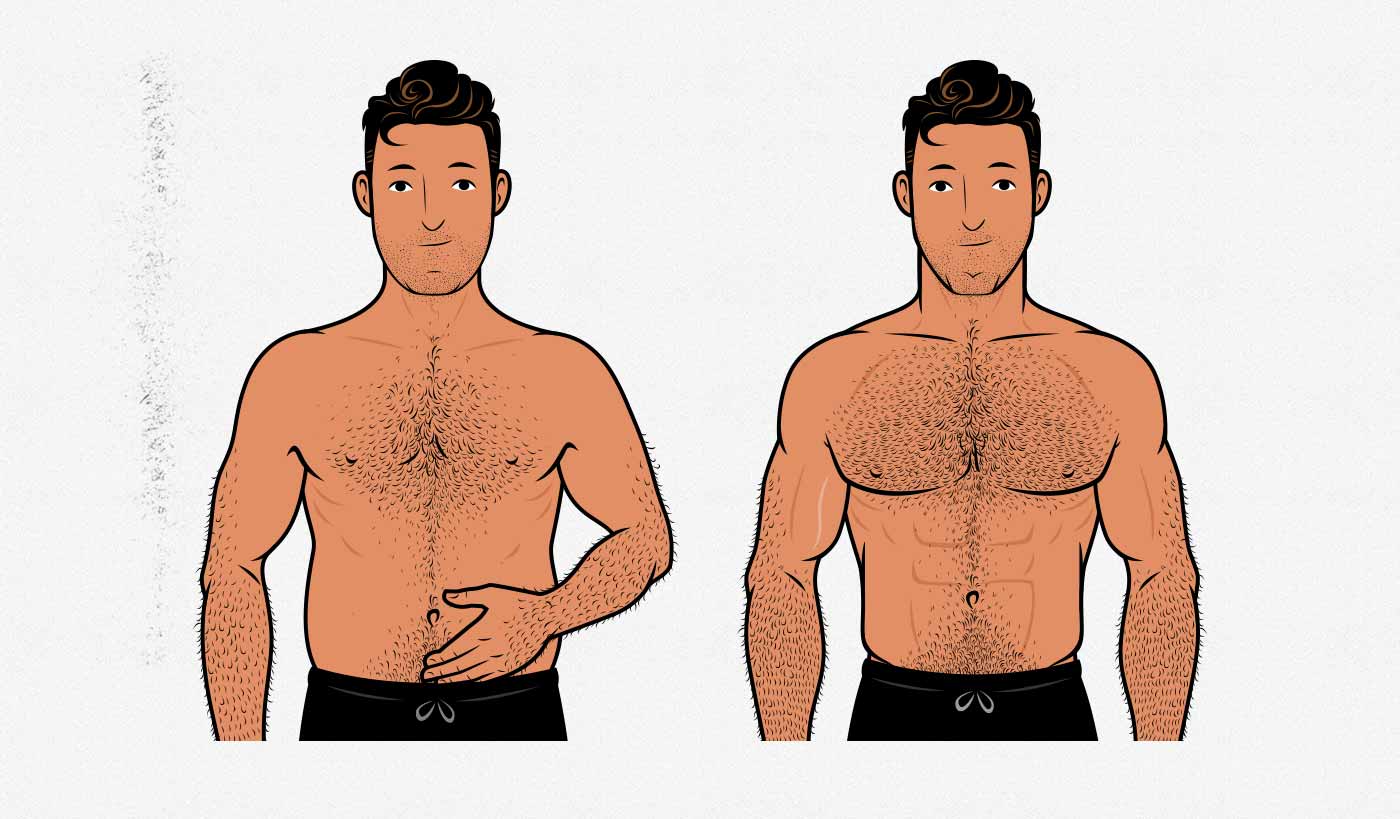
There’s another question buried in this question, though.
Is sugar more fattening than other sources of calories? That depends on how much sugar you’re eating and what source that sugar comes from, but in general, so long as you consume added sugars in moderation, it shouldn’t cause you to gain extra fat as you bulk up (study).
When it comes to moderation, many experts—including Amber Bonsall, RD—recommend keeping your intake of added sugars to about 10% of your total calorie intake. However, this doesn’t mean that you need to be overly concerned about your intake of fruits and dairy, just that you may want to limit your intake of added sugars.
On the other hand, many other experts, such as Dr James Krieger and Dr Spencer Nadolsky, are much less concerned about the harms of added sugars in the context of people who are lean, active, and healthy. After all, most research shows no harm from consuming even fairly large amounts of sugar in people who are active and have a good body composition.
If you’re curious, here’s our article about the pros and cons of clean and dirty bulking. Not all foods have the same impact on us while bulking up. It just so happens that sugar (and carbs in general) tend to go along fairly well with lifting weights.
Are Some Sugars More Fattening Than Others?
There are certainly pros and cons to the different types of sugar that you consume, just not necessarily for the reasons you might assume. Cane sugar and HFCS both have their micronutrients processed out, so there’s no real benefit to them beyond their carbohydrate and calorie content.
Also, keep in mind that desserts don’t only contain empty calories. If you look at something like ice cream, there’s dairy in there. With something like a cherry pie, there are probably cherries and eggs in there.
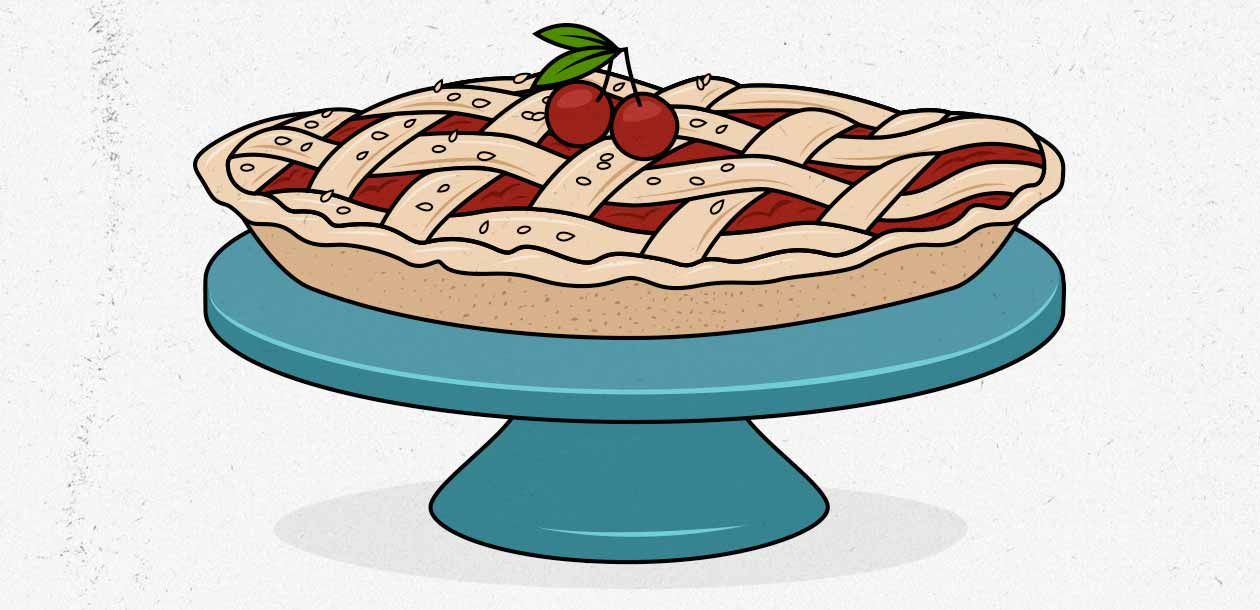
However, even with desserts that are 100% devoid of micronutrients, that still doesn’t mean they’re bad—at least not in an absolute sense. Your body can still break them down and get calories out of them. And as ectomorphs struggling to eat enough to build muscle, calories are exactly what we need more of.
There are also many sources of sugar that are rich in vitamins and minerals, such as fruits, dairy, and honey. For example, the fibre found in fruit can help with digestive health, which can be very helpful while bulking up. To quote The Harvard School of Public Health:
Fruits and vegetables contain indigestible fiber, which absorbs water and expands as it passes through the digestive system. This can calm symptoms of an irritable bowel and, by triggering regular bowel movements, can relieve or prevent constipation (study). The bulking and softening action of insoluble fiber also decreases pressure inside the intestinal tract and may help prevent diverticulosis (study). —Harvard School of Public Health
It’s worth pointing out that frozen fruit counts as fresh fruit too. This can make it easy to blend fruits into smoothies.
Dried fruit is also quite nutritious while being extremely calorically dense, which is great for us skinny guys who are having a hard time eating enough calories to gain weight. (If that’s you, here’s our article about how to eat more calories.)
Why Do Some Bodybuilders Avoid Sugar While Bulking?
If someone is overweight, then anything that’s causing weight gain is unhealthy. Sugar, especially if it’s heavily refined, can thus be a problem. However, when someone is skinny, the situation is reversed, and foods that help us gain weight can actually be quite helpful. As a result, it’s often quite effective to bulk up on a diet that’s rich in fruit, fruit smoothies, and dried fruit. And, as we mentioned above, some processed sugar probably won’t hurt either.
Still, some experts believe that even the sugar found in fruits can be a problem. For example, there’s a famous study conducted by Robert Lustig that found that adding 150 calories of sugar per day increased the risk of developing diabetes by 1%. Keep in mind that this study had the participants adding in 150 calories, bringing the participants into a slight calorie surplus and causing them to gain body fat.
To put that into perspective, obesity increases the risk of developing diabetes by 9900%. A meta-analysis of all these studies concluded that it’s a calorie surplus that contributes most to fat gain, and that it’s gaining fat that contributes the most to the risk of developing diabetes. If we’re bulking up by gaining muscle rather than fat, the effect would be quite different.
On a more positive note, another study found that 150 minutes of exercise per week combined with a slight calorie deficit resulted in a 58% reduction in the risk of developing diabetes.
Anyway, for us ectomorphs sometimes these things are backwards. We’re trying to gain weight, we’re lifting weights, we’re eating enough protein, and hopefully, we’re eating diets that are made up mostly of whole foods. We’re in an entirely different situation.
How Much Sugar Can You Have While Bulking?
Up above we mentioned that large quantities of fructose can cause health problems and fat gain, but that it takes fairly obscene amounts of fructose for these problems to arise. Furthermore, it seems that if you’re leaner, more physically active, routinely lift weights, or if you’re doing cardio while bulking, you’ll be burning more calories and have a higher tolerance for sugar.
You could still play it safe by keeping your added sugar intake to under 10% of your calories, but that recommendation is going to vary depending on your lifestyle.
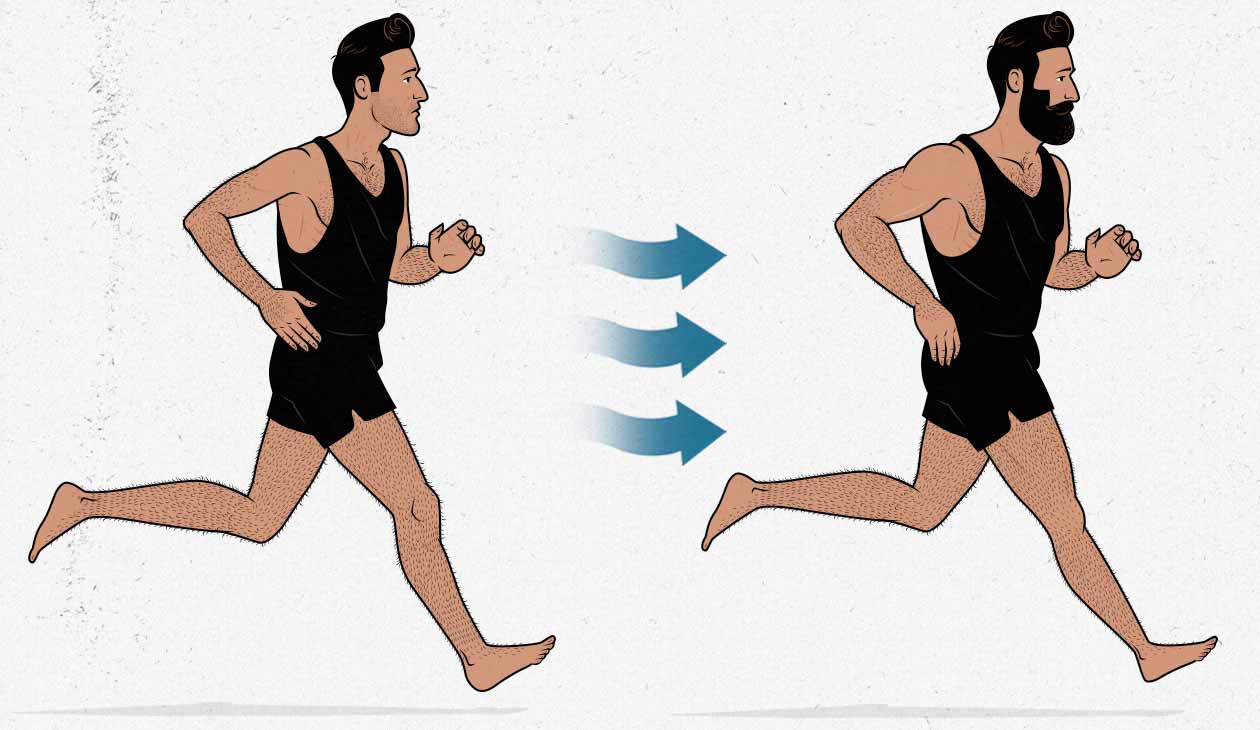
Then, when it comes to the sugar found in fruit and dairy, how much you eat should depend on your activity levels and goals. If you were trying to lose weight, it might help to get more of your calories from foods that are higher in fibre and lower in calories, such as broccoli, lettuce, spinach, celery, carrots, green beans, and apples. That way you’d get a lot of food volume, fibre, and phytonutrients per calorie. Fibre is quite filling, so this might help you eat fewer calories, causing weight loss.
On the other hand, if you’re a thin guy trying to gain weight, you’ll probably have more success by focusing on higher-calorie foods like bananas, prunes, raisins, milk, yogurts, kefir, and so on. These foods contain some sugar, but it’s not added sugar, and so you probably don’t need to track or limit it.
As for how many calories should be coming from carbohydrates in general, the consensus seems to be that a diet made up of around 50–60% carbohydrates tends to be ideal for building muscle and bulking up. For example, this study recommends a diet made up of 55–60% carbohydrates for bulking up. (More on bulking macronutrients here.)
What About Artificial Sweeteners While Bulking?
When we think of artificial sweeteners we normally think of diet soda, but keep in mind that protein powders are full of that stuff, too. In fact, if you start regularly consuming protein powder while bulking up, your intake of artificial sweeteners might actually rise quite high.
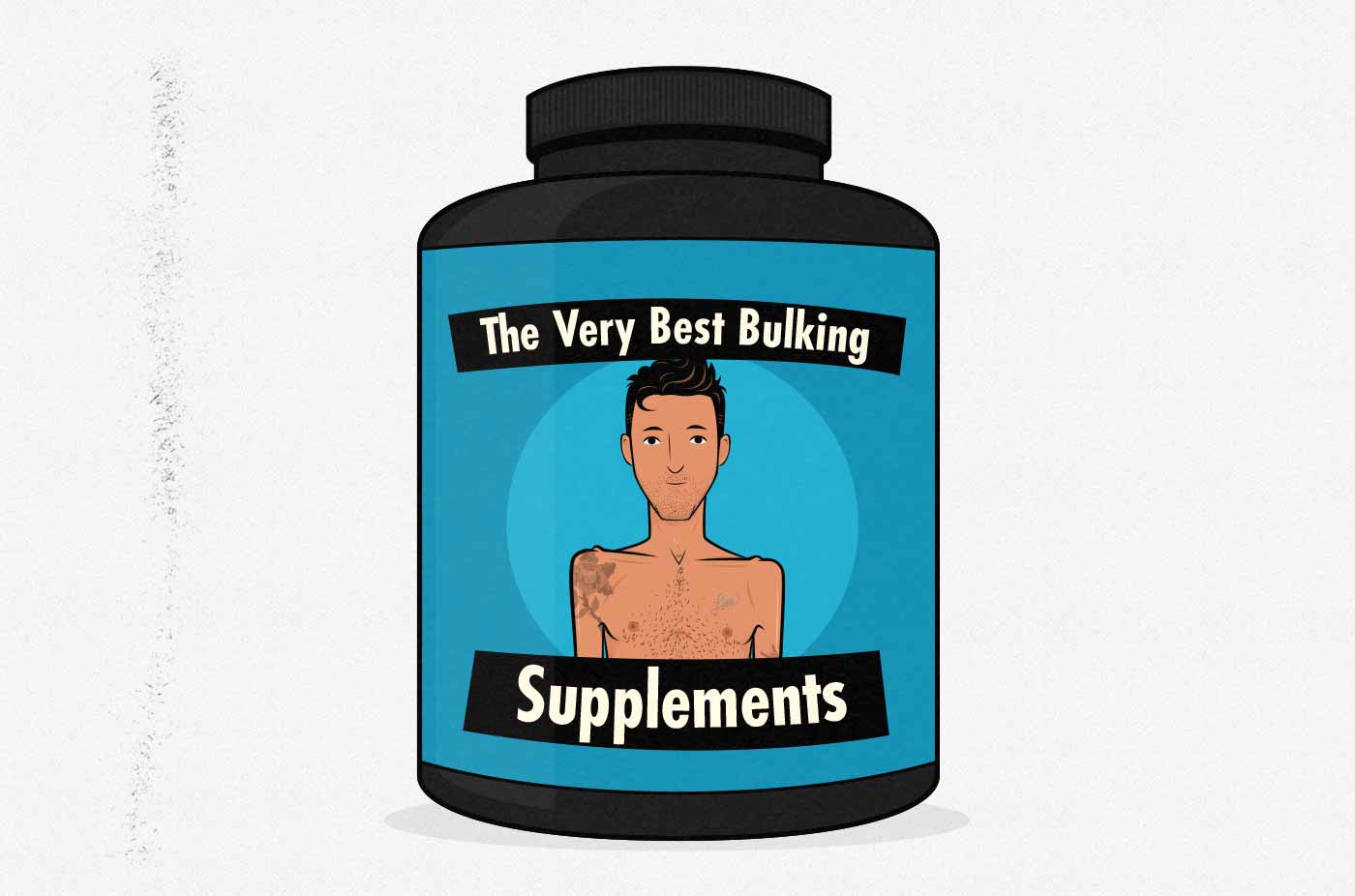
It’s hard to tell if there are any unknown downsides to artificial sweeteners, but so far researchers haven’t uncovered any (study, study). Jared and I were talking about this over coffee and a stranger chimed in with, “The downside is the taste!”
According to the Mayo Clinic, there are even some benefits, such as helping people to lose weight. Their stance is the following:
There’s no sound scientific evidence that any of the artificial sweeteners approved for use in the United States cause cancer or other serious health problems. Numerous studies confirm that artificial sweeteners are generally safe in limited quantities, even for pregnant women. —Mayo Clinic Staff
However, as with everything, it’s wise to practice moderation. They add:
When choosing sugar substitutes, it pays to be a savvy consumer. Artificial sweeteners and sugar substitutes can help with weight management. But they aren’t a magic bullet and should be used only in moderation. —Mayo Clinic Staff
So although there doesn’t seem to be any harm in consuming some artificial sweeteners, as with sugar, just try to practice moderation.
So, How Much Sugar is Okay While Bulking?
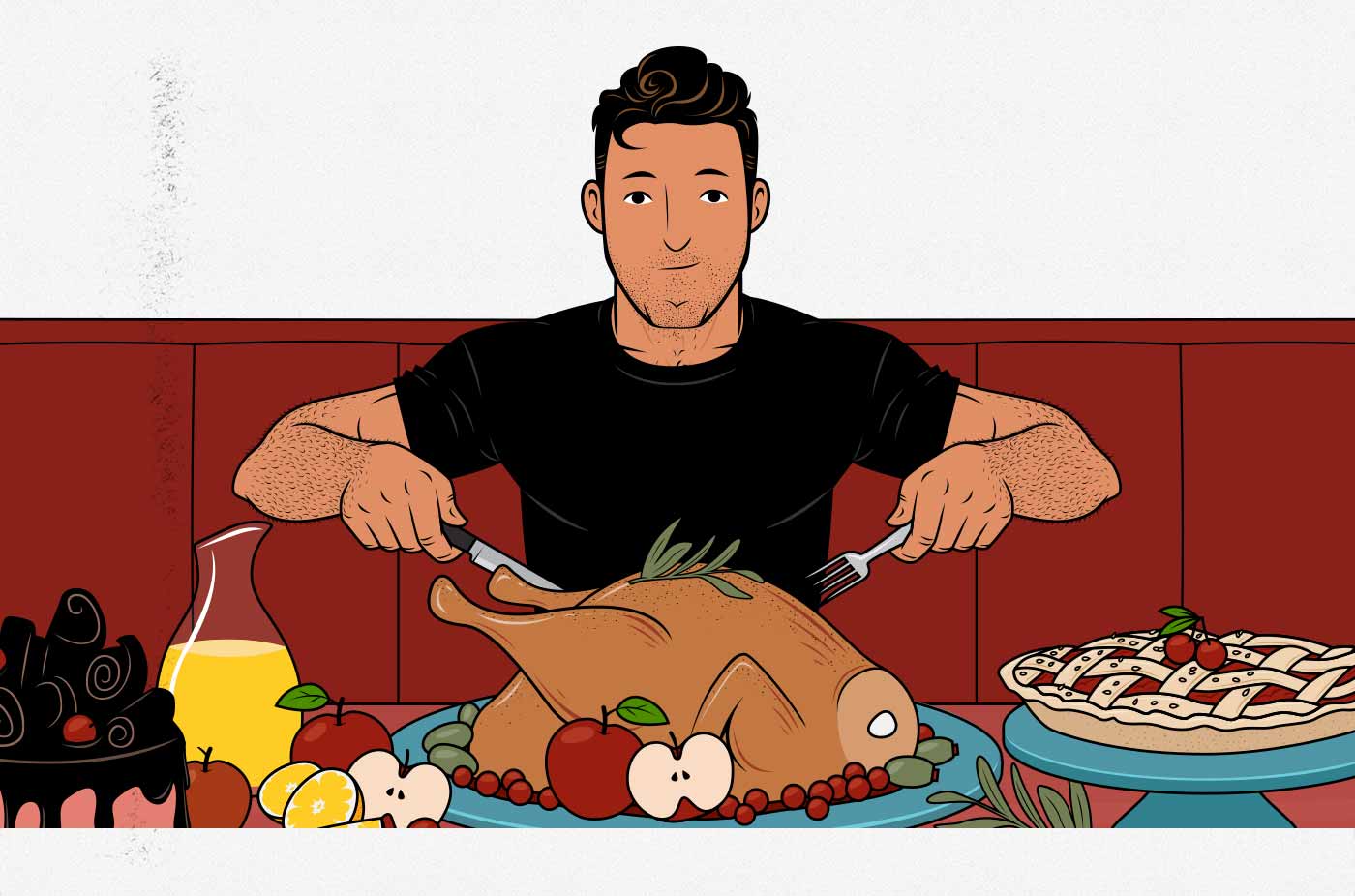
It’s probably okay to consume a moderate amount of sugar while bulking. Most experts, such as the Mayo Clinic, say that it’s fine for our health. And in terms of our body composition, having some sugar in our diets shouldn’t make it any harder to build muscle leanly.
- Processed sugar can still be digested, stored as muscle glycogen, and used as an energy source while lifting weights, as well as in our general lives. If you want to play it completely safe, you could cap your intake of added sugars at 10% of your calorie intake, but it’s unclear if there’s any harm in going beyond that limit.
- Fruits, whether fresh, frozen, or dried, are great for helping skinny guys bulk up. Just make sure to get some vegetables and starchy vegetables in there too.
- Non-caloric sweeteners seem to be okay in moderation.
- Everyone is different, your results may vary, and it’s wise to consult with a physician or registered dietitian before making drastic changes to your diet.

